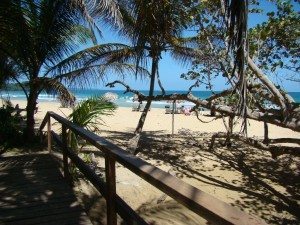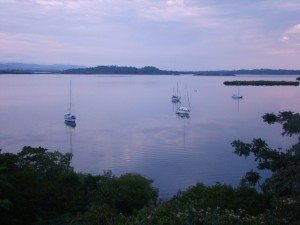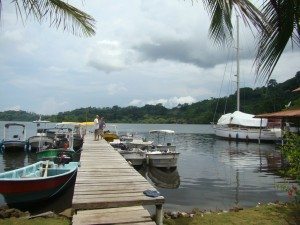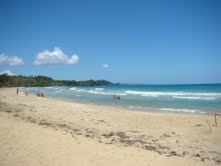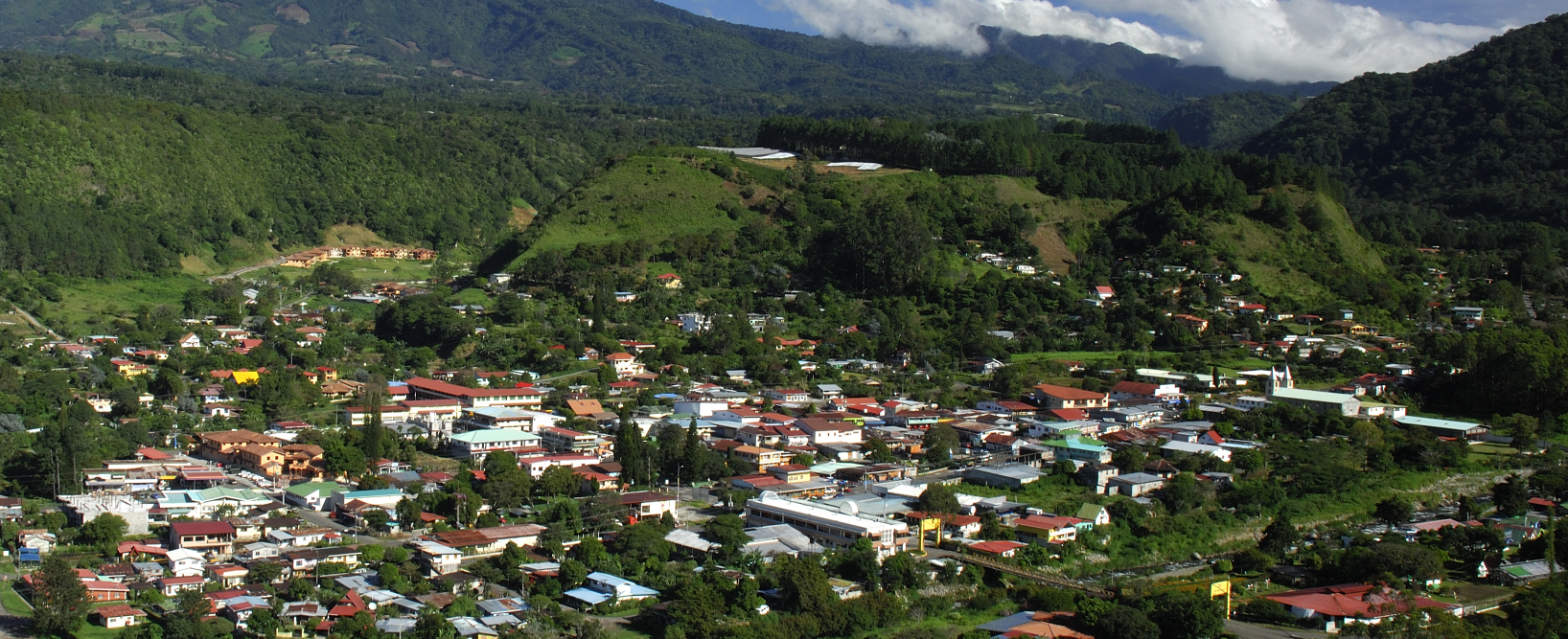Article and Photos by Linda Card
In the past two weeks I’ve had the opportunity to travel to two of Panama’s most popular destinations. I live in David, so neither one is too far away, but they are worlds apart in many ways, from David and from each other. While they are both on the western side of Panama, Bocas del Toro and Boquete are probably different in more ways than they are the same. Here we’ll take a look at what it’s like to live in Bocas del Toro.
Caribbean Beaches
Bocas del Toro is an archipelago in the Caribbean Sea in the northwest corner of Panama, near the border with Costa Rica (CR). If you are a person who likes to be around, in or on the water, Bocas may be a great place for you.
The main island of the group is Isla Colón, where Bocas Town is located. To get there you must travel by air or water. There are flights from Panama City (PC) and San Jose, CR, and water taxis from Almirante and Changuinola. Bocas Town has a funky, laid back feel to it, typical of island getaways. There are plenty of hotels, resorts, and hostels, of all sizes, characters and price ranges, so it’s not hard to find a place to stay (except during peak times). There’s also an assortment of restaurants and bars, many of them overlooking the water, where you can hang out as long as you like.
Bocas del Toro is stunningly beautiful, with turquoise seas and white sand beaches. The islets are covered with rainforest foliage and vibrantly painted flowers. Exotic creatures like sloths, toucans and iguanas live in the jungle. Certainly, a visit is mandatory if you are a beach and water loving traveler. But living there is a far cry from being a tourist, as many blogs and books will testify.
Life on the Water
Since there are no roads between land masses, few folks have cars. All transport is by boat, large or small, commercial or private. Water taxi services from Almirante to Bocas Town are reliable, inexpensive, and fast. Once in Bocas, several providers offer water taxi service to the various islands, and some resorts include transport among their guest services. Large loads are carried on a ferry that runs regularly between Almirante and Bocas Town, but space is limited.
Plenty of people live in town and on the islands, and they have to be able to buy groceries, hardware, and general household and personal stuff. While the shopping options have improved in recent years in Bocas Town, they are still very limited. Many folks make regular trips to David or PC for their shopping, and then they have to get their stuff back home.
Fortunately there are trucking companies, large and small, that will carry your goodies from David or PC to Almirante, then on to Bocas Town, but then you still have to get them by water taxi or “panga” (a long, narrow, wood or fiberglass boat, with outboard motor or paddles) to your final destination. Friends of mine have built a house on a steep slope with a gorgeous view over the bay. Whenever they get to their dock with their panga loaded with stuff, they call a helper from the nearby Indian village to come and carry the load up to their house. My friend said to me on our last visit, “I don’t know what we’d do if we didn’t live so close to the village.”
Since all movement takes place via water, the weather is always a consideration. Most pangas are not covered, and Bocas get a lot of rain. If the wind kicks up or a storm moves through, motoring in a panga becomes uncomfortable at least, and dangerous at worst. Add to this concern the ever increasing price of fuel, and you realize that trips to and from town have to be planned for maximum efficiency.
Considering Costs
Tourist spots must have infrastructure to meet their guests’ needs. Red Frog Resort on Isla Bastimentos is a good example. They have three generators, gallons and gallons of water from wells, and multiple backups for communications (radio, phone, and internet). Unfortunately, infrastructure in much of the island area is lacking. Again, it’s slowly improving, but roads (where they exist) are typically unpaved and full of holes, and public docks for private pangas are very few. Power outages are not uncommon, and even a short dry spell stresses the fresh water supply. In the outlying, more remote areas, accessing utilities can be difficult and expensive.
Utilities aren’t the only thing that can be expensive. Anywhere in the world, island living is more expensive simply because transport of goods by boat adds to shipping costs. Bocas is no exception, so groceries and ordinary goods cost more than on the mainland. For instance, a pound of Panama coffee beans costs $6.79 in David, and $7.59 in Bocas. In general, the cost of living in Panama is less than in North America or Europe, so you’re still ahead. If you live on a limited budget, however, you’ll want to research costs before settling in Bocas.
Don’t be Discouraged
Plenty of adventurous folks, both locals and foreigners, have tackled and overcome the challenges associated with making a home in Bocas del Toro. Full of interesting personalities, quirky businesses, and international boaters, Bocas attracts the unconventional. A sense of community brings bocateños and extranjeros together for local projects and traditional celebrations. The area’s natural beauty and exotic feel, combined with the variety of adventure and water sports, create a very desirable destination.
So don’t be discouraged, but just know what to expect. Our intent here is to provide you with first-hand knowledge so you can make an informed decision about Panama. If you are up for the adventure, and have the resources, determination and stamina, you too can create your own little paradise out of the jungle in Bocas del Toro.



